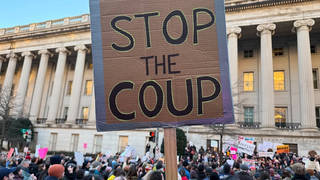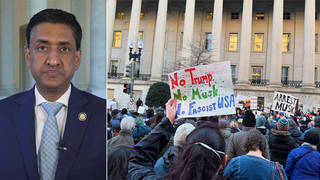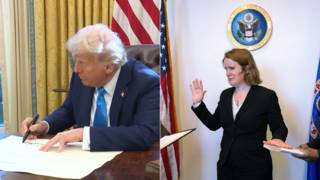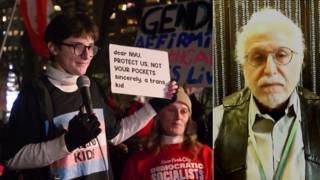This content originally appeared on Democracy Now! Audio and was authored by Democracy Now!.
This post was originally published on Radio Free.
This content originally appeared on Democracy Now! Audio and was authored by Democracy Now!.
This post was originally published on Radio Free.
This content originally appeared on Democracy Now! and was authored by Democracy Now!.
This post was originally published on Radio Free.
This content originally appeared on Democracy Now! for Broadcasters – HD MP4 and was authored by Democracy Now! for Broadcasters – HD MP4.
This post was originally published on Radio Free.
This content originally appeared on Democracy Now! and was authored by Democracy Now!.
This post was originally published on Radio Free.

President Trump’s targeting of South Africa is clearly tied to his influential adviser Elon Musk and a coterie of wealthy U.S. oligarchs, “all of whom in some way or other grew up in South Africa as children.” These men are known as the “PayPal Mafia” due to their involvement in the founding of the financial tech company PayPal, explains reporter Chris McGreal. McGreal, a former South Africa correspondent for The Guardian, outlines Musk’s pro-apartheid and neo-Nazi family history, which appears to form the basis of his adherence to a right-wing ideology that believes white South Africans “are the victims of the end of apartheid” and at risk of a “white genocide.”
This content originally appeared on Democracy Now! and was authored by Democracy Now!.
This post was originally published on Radio Free.
Democracy Now! Monday, February 10, 2025
This content originally appeared on Democracy Now! Audio and was authored by Democracy Now!.
This post was originally published on Radio Free.
This content originally appeared on Democracy Now! for Broadcasters – HD MP4 and was authored by Democracy Now! for Broadcasters – HD MP4.
This post was originally published on Radio Free.
This content originally appeared on Democracy Now! and was authored by Democracy Now!.
This post was originally published on Radio Free.
This content originally appeared on Democracy Now! and was authored by Democracy Now!.
This post was originally published on Radio Free.
This content originally appeared on Democracy Now! and was authored by Democracy Now!.
This post was originally published on Radio Free.
This content originally appeared on Democracy Now! and was authored by Democracy Now!.
This post was originally published on Radio Free.
This content originally appeared on Democracy Now! and was authored by Democracy Now!.
This post was originally published on Radio Free.
This content originally appeared on Democracy Now! and was authored by Democracy Now!.
This post was originally published on Radio Free.

The Trump administration is planning to shutter the Office of Environmental Justice and External Civil Rights at the Environmental Protection Agency and has placed nearly 170 employees on administrative leave. “I’m very concerned about the deregulation and the focus on corporate profits,” says Mustafa Santiago Ali, the former head of the environmental justice program at the EPA. He resigned in 2017 to protest a Trump administration proposal to severely scale back the size and work of the agency. “Any time that we place profit over people, then we are putting a crosshair on our most vulnerable, our most marginalized,” says Ali.
This content originally appeared on Democracy Now! and was authored by Democracy Now!.
This post was originally published on Radio Free.

We speak with Democratic Congressmember Ro Khanna of California about the Trump administration’s ongoing assault on the federal bureaucracy and the gutting of various agencies, led by the president’s unelected billionaire adviser Elon Musk and his so-called Department of Government Efficiency.
“No DOGE employee should have access to any of Americans’ sensitive, confidential information, and they should not have access to be able to stop payments,” he says. Khanna calls Musk’s actions “unconstitutional” and says the Trump administration must be held accountable. “There is a movement now which is pushing back. We did not have that for a couple months, I acknowledge that. But the Democratic Party in this last week has had a new energy and a new resolve to stand up.”
Khanna also comments on the use of Guantánamo Bay to detain immigrants, Trump’s colonial proposals to seize Gaza and other foreign territories and more.
This content originally appeared on Democracy Now! and was authored by Democracy Now!.
This post was originally published on Radio Free.
Democracy Now! Friday, February 7, 2025
This content originally appeared on Democracy Now! Audio and was authored by Democracy Now!.
This post was originally published on Radio Free.
This content originally appeared on Democracy Now! and was authored by Democracy Now!.
This post was originally published on Radio Free.
This content originally appeared on Democracy Now! for Broadcasters – HD MP4 and was authored by Democracy Now! for Broadcasters – HD MP4.
This post was originally published on Radio Free.
This content originally appeared on Democracy Now! and was authored by Democracy Now!.
This content originally appeared on Democracy Now! and was authored by Democracy Now!.
This content originally appeared on Democracy Now! and was authored by Democracy Now!.
This post was originally published on Radio Free.
This content originally appeared on Democracy Now! and was authored by Democracy Now!.
This post was originally published on Radio Free.
This content originally appeared on Democracy Now! and was authored by Democracy Now!.
This post was originally published on Radio Free.
This content originally appeared on Democracy Now! and was authored by Democracy Now!.
This post was originally published on Radio Free.

We speak with Karla Gilbride, the former general counsel of the U.S. Equal Employment Opportunity Commission, who was fired by President Trump in late January along with two commissioners at the federal agency that enforces civil rights law in the workplace. The EEOC was created as part of the 1964 Civil Rights Act and is tasked with investigating discrimination based on race, ethnicity, sex and other characteristics, but the Trump administration is gutting the agency as part of its larger assault on DEI, or diversity, equity and inclusion. The EEOC says it will no longer focus on anti-trans discrimination and vows to uphold a binary view of sex and gender.
This content originally appeared on Democracy Now! and was authored by Democracy Now!.
This post was originally published on Radio Free.

The Trump administration claims an order to withhold funds from hospitals that offer gender-affirming care to transgender youth is “already having its intended effect” as hospitals announce a halt to gender-affirming care for trans patients. The American Civil Liberties Union, Lambda Legal and others filed a lawsuit Tuesday on behalf of transgender youth who say the order is depriving them of medical care “solely on the basis of their sex and transgender status.” ACLU lawyer Chase Strangio says the situation is “catastrophic for transgender people of all ages, particularly transgender youth,” and notes Trump’s near-daily attacks are targeting a community that makes up less than 1% of the U.S. population. “We need to see people standing up.” We are also joined by pediatrician Dr. Jeffrey Birnbaum, who has vowed to keep working with transgender youth patients in New York. “Keep politics out of science,” says Dr. Birnbaum.
This content originally appeared on Democracy Now! and was authored by Democracy Now!.
This post was originally published on Radio Free.